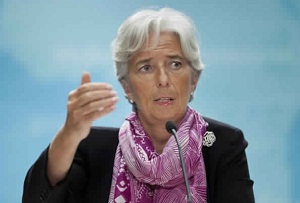
Managing Director of the International Monetary Fund (IMF) Christine Lagarde admitted here Thursday that while cheap oil prices are welcome news for consumers’ wallets, the global economy needs some bold policies to make a recovery – despite the fact that the US market is bouncing back.
“Should lower oil prices and a stronger recovery in the United States make us more upbeat about the prospects for the global economy? The answer is most likely ‘No,’ since there are still powerful factors that weigh on the downside,” she told the Council on Foreign Relations. “The oil price and U.S. growth are not a cure for deep-seated weaknesses elsewhere. Too many countries are still weighed down by the legacies of the financial crisis, including high debt and high unemployment,” she explained.
“The United States is the only major economy that is likely to buck the trend this year, while others are being held back – mainly by lackluster investment. “A promising recovery continues in the UK, but growth remains very low in the Euro Area and Japan. And emerging economies, led by China, are slowing down,” she went on.
Among the risks to a global recovery, Lagarde cited “the asynchronous normalization of monetary policies in advanced economies,” the “triple hit of a strengthening US dollar, higher global interest rates, and more volatile capital flows” on developing markets, the possibility that Europe and Japan may get “stuck in a world of low growth and low inflation for a prolonged period,” and “increased geopolitical risks” such as the instability in Ukraine and Nigeria. “This all points to one thing: the need for a powerful policy mix that can strengthen the recovery and provide better employment perspectives for citizens worldwide,” she stressed. “Accommodative monetary policies remain essential. Fiscal adjustment must be as growth and job-friendly as possible. And above all, policymakers need to finally step up structural reforms. “This economic mantra – support demand, growth, and structural reforms – is not new, but now takes on increased urgency. And it places increased emphasis on political leadership,” she noted.
She advised oil exporting countries to “cushion the shock” on the economy.
“Some are using their rainy day funds and fiscal deficits to adjust public spending more gradually. Others resort to allowing substantial exchange rate depreciation, which poses the risk of inflation and may require tighter monetary policies,” Lagarde said.
Describing the need for “political courage,” she noted that “the drop in oil prices provides a golden opportunity to cut energy subsidies and use the savings for more targeted transfers to protect the poor – for which the IMF has been pushing hard.” “We have recently seen a successful decrease in fossil fuel subsidies in countries such as Cameroon, Cأ´te d’Ivoire, Egypt, Haiti, India, Indonesia, and Malaysia. “In some advanced countries, policymakers should also seize the moment to increase energy taxes to build fiscal buffers or reduce other taxes, especially on labor,” she added.
Source : KUNA Kuwait News agency












